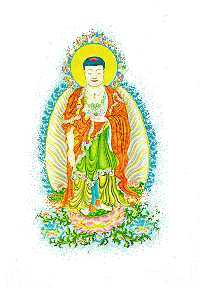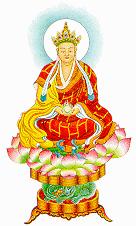
 Contents
Contents
The fundamental Buddhism is summarized by Shakyamuni in the Dhammapada:

It is simple but not easy. When a kid is three years old, he knows it. However, when he is over 80 years old, he cannot really practice it in his daily life.
5.1 Morality
Morality is the preliminary stage on the path to attain Buddhahood. It is a necessary condition, though not sufficient, leading to wisdom. It is absolutely essential for enlightenment.
Morality in Buddhism is a rational and practical mode based on verifiable facts and individual experience, which is regarded as the one of the most perfect moral code ever known in the world.
What is the criterion of morality according to Buddhism?
In the admonition given by the Buddha to young Rahula, there is the answer.
If there is a deed, Rahula, you wish to do, reflect thus: Is this deed conducive to my harm, or to others' harm, or to that of both? Then is this a bad deed entailing suffering. From such a deed, you must desist.
If there is a deed you wish to do, reflect thus: Is this deed not conducive to my harm, nor to others' harm, nor to that of both? Then is this a good deed entailing happiness. Such a deed you must do again and again.
Thus, in assessing morality, a Buddhist takes into consideration of the interests of both himself and others - animals not excluded.
To understand the exceptionally high standard of morality, one can vigorously study
Good deeds are essential for one's emancipation, but when once the ultimate goal of holy life or enlightenment is attained, one transcends both good and evil. Morality is a means to an end, but not an end in itself.
5.2 Three Poisons / Three Evil Roots
 In Flower Adornment Sutra, it says that
In Flower Adornment Sutra, it says that
It is the well known Repentance Verse in Buddhism. In Buddhism, the distinction between what is good and what is bad is simple. It hinges on the intention or motivation from which an action originates. The deed which is associated with greed/attachment, hatred/illwill, delusion/stupidity is evil.
Greed, hatred and delusion are called the Three Poisons or Three Evil Roots, which are the primary source of all evil deed. It is the Three Posions that create all bad Karma, resulting all kinds of suffering in accordance with the Principle of Cause and Effect. The Three Poisons are also obstacles to the attainment of good Karma. Thus we have to abandon them by all means.
 5.3
Five Precepts
5.3
Five Precepts
Buddhism is the most profound and wholesome education directed by the Buddha towards all people. Five precepts are the curriculum of Buddhist teaching, which are embraced in the moral code of Buddhism. By observing precepts, not only do you cultivate your moral strength, but you also perform the highest service to your fellow beings. The Five Precepts are:
These are the basic precepts that all people should practice and abide by. As a result, you will live in Three Good Paths, not in Three Evil Paths, enjoy all the blessings, happiness and freedom in Human and Deva Realm.
One must not deliberately kill any living creatures, either by committing the act oneself, instructing others to kill, or approving of or participating in act of killing. It is a respect to others' lives.
One should not deprive others (animals not excluded) of the right to live. If one is hurt or killed, one's family, relatives, friends will suffer. It is the cause of rebirth in Three Evil Paths. The effect of killing to the performer are brevity of life, ill health, handicapped and fear.
It is a respect to other's properties. If something is not given, one may not take it away by stealing, by force or by fraud. Greed is one of the Three Poisons, which leads us to attachment and suffering. The bad effect of stealing are poverty, misery, disappointment, etc.
5.3.3. Do not indulge in sexual misconduct
Though the moral standards are different in different countries and in different times, rape, adultery and other abnormal sexual behavior that involve physical and mental injury to others should be prohibited. It is also a matter of respect.
Sexual disire is one of the main causes of rebirth in the Six Paths. If we wish to end the birth and death cycle, we should not indulge in sexual misconduct or any other abnormal form of sexual relationship.
The effect of sexual misconduct are having many enemies, always being hated, and union with undesirable wives and husbands.
Buddhism emphasizes wisdom. Taking intoxicant will descend and lose the seed of wisdom. Intoxicants, such as drugs, liquor, smoking, etc., are harmful to health. It seems that taking intoxicant is not hurting others. However, if we are drunk and lose our consciousness, we may easily commit evil deeds and hurt others. Therefore, one who breaks this precept will tend to break all other precepts along with it.
Five Precepts. The Ten Good Deeds are:
The first three are the first three of Five Precepts; these are body deeds. The last three are the Three Poisons, these are mind deeds. The remaining four is an elaboration of the evil deeds performed by speech. Body, speech and mind are the three means of actions.
Apart from avoiding the evil actions, one can take positive attitude in performing the good actions. The Ten Meritorious Deeds allow people to gain a happy and peaceful life as well as to develop knowledge and understanding. The Ten Meritorious Deeds are:
To fulfil all these requirements, one will be re-born in the Deva Realm. One will enjoy all kinds of happiness and blessings except the suffering of Five Forms of Decaying.
5.5 Taking Refuge
To study Buddhism, is it necessary to take refuge? What is the importance of taking refuge?
The Buddha never claimed any divinity. People take refuge in the Buddha as a teacher or master who has shown the real path of emancipation. It is perhaps the only religion which states that a human being has the power to help and free himself.
On the other hand, Buddhism is an education. Taking refuge is just like registration and admission in school. With the guidance by the teachers and the support from the classmates, studying in school is generally better than self-studying. All persons who have resolved in studying Buddhism and cultivating the Way should take refuge. Buddhists who take refuge in the Buddha are not seeking for protection nor reward for them, but to gain inspiration and right understanding for their own purification and cultivation of the Way.
Taking refuge is voluntary and sincere, self-conscious and self-discipline. It is a vow to oneself, taking refuge with:
The Three are also known as Three Jewels or Three Treasures.

